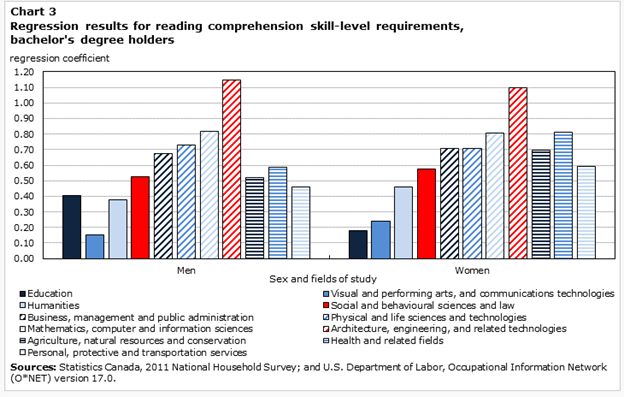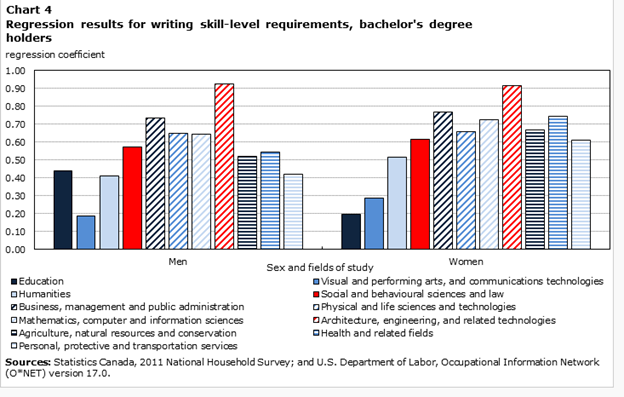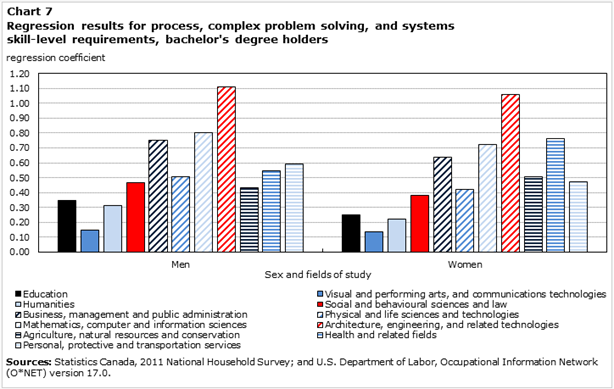I’ve been hard on Statscan lately because of their mostly-inexcusable data collection practices. But every once in awhile the organization redeems itself. This week, that redemption takes the form of an Analytical Studies Branch research paper by Marc Frenette and Kristyn Frank entitled Do Postsecondary Graduates Land High-Skilled Jobs? The implications of this paper are pretty significant, but also nuanced and susceptible to over-interpretation. So let’s go over in detail what this paper’s about.
The key question Frenette & Frank are answering is “what kinds of skills are required in the jobs in which recent graduates (defined operationally here as Canadians aged 25-34 with post-secondary credentials) find themselves”. This is not, to be clear, an attempt to measure what skills these students possess; rather it is an attempt to see what skills their jobs require. Two different things. People might end up in jobs requiring skills they don’t have; alternatively, they may end up in jobs which demand fewer skills than the ones they possess. Keep that definition in mind as you read.
The data source Frenette & Frank use is something called the Occupational Information Network (O*NET), which was developed by the US Department of Labour. Basically, they spend ages interviewing employees, employers, and occupational analysts to work out skill levels typically required in hundreds of different occupations. For the purpose of this paper, the skills analyzed and rated include reading, writing, math, science, problem solving, social, technical operation, technical design and analysis and resource management (i.e. management of money and people). They then take all that data and transpose it onto Canadian occupational definitions. So now they can assign skill levels to nine different dimensions of skills to each Canadian occupation. Then they use National Household Survey data (yes, yes, I know), to look at post-secondary graduates and what kind of occupations they have. On the basis of this, at the level of the individual, they can link highest credential received to the skills required in their occupation. Multiply that over a couple of million Canadians and Frenette and Frank have themselves one heck of a database.
So, the first swing at analysis is to look at occupational skill requirements by level of education. With only a couple of exceptions – technical operations being the most obvious one – these more or less all rise according to the level of education. The other really amusing exception is that apparently PhDs do not occupy/are not offered jobs which require management skills. But it’s when they get away from level of education and move to field of study that things get really interesting. To what extent are graduates from various fields of study employed in jobs that require, for instance, high levels of reading comprehension or writing ability? I reproduce Frenette & Frank’s results below.
Yep. You read that right. Higher reading comprehension skill requirements are for jobs occupied by Engineers. Humanities? Not so much.
It’s pretty much the same story with writing, though business types tend to do better on that measure.
…and critical thinking rounds out the set.
So what’s going on here? How is it that that humanities (“We teach people to think!“) get such weak scores and “mere” professional degrees like business and engineering do so well? Well, let’s be careful about interpretation. These charts are not saying that BEng and BCom grads are necessarily better than BA grads at reading, writing and critical thinking, though one shouldn’t rule that out. They’re saying that BEng and BCom grads get jobs with higher reading, writing and critical thinking requirements than do BAs. Arguably, it’s a measure of underemployment rather than a measure of skill. I’m not sure I personally would argue that, but it is at least arguable.
But whatever field of study you’re from, there’s a lot of food for thought here. If reading and writing are such a big deal for BEngs, should universities wanting to give their BEngs a job boost spend more time giving them communication skills? If you’re in social sciences or humanities, what implications do these results have for curriculum design?
I know if I were a university President, these are the kinds of questions I’d be asking my deans after reading this report.




 Tweet this post
Tweet this post

Small issue here that isn’t quite teased out…note that these use ONet classifications that have to be mapped to Canadian classifications, which is a challenge, but more importantly, they assess the requirements two ways — one through self-identified assessments of what is needed (prone to over-estimation) and matched against what analysts of that sector say are needed (often leading the curve, not following it). So, could one argue that engineers and analysts of engineers feel that reading comprehension skills are incredibly high but in fact, on a comparative basis, are actually relatively medium? Yes. But that isn’t what the report says. It is a good analysis, but there are weaknesses. It also doesn’t fit with people who are in some of those “high skilled” jobs yet still claim they are vastly over-qualified for what is asked of them. Which means the analysis was wrong, or it could be that the “entry” requirements are high simply because it is a competitive field and thus credential inflation/skill inflation drives the increased “entry requirement”.
Yep interesting. I thought about this myself. It sounds like the O*NET stuff is quite well vetted, but one still has to wonder how different sectors evaluate different skills. I think, for example, about how the goals and outcomes of reading comprehension and writing vary an awful lot depending on whether you are writing a technical report or a grant proposal. Also how different sectors could interpret “problem solving,” which is generic. One would have to more closely scrutinize how the O*NET taxonomy was built, methinks. Related to your comments about worker perceptions and credential inflation (re: baseline of entry level skills), I also wonder about the relative roles of formal education and experience in these evaluations.